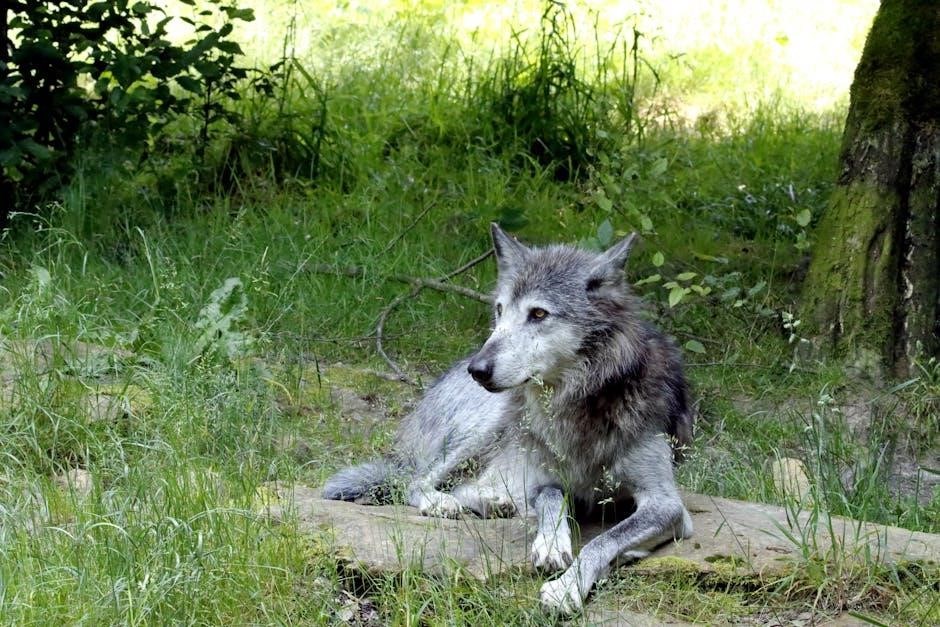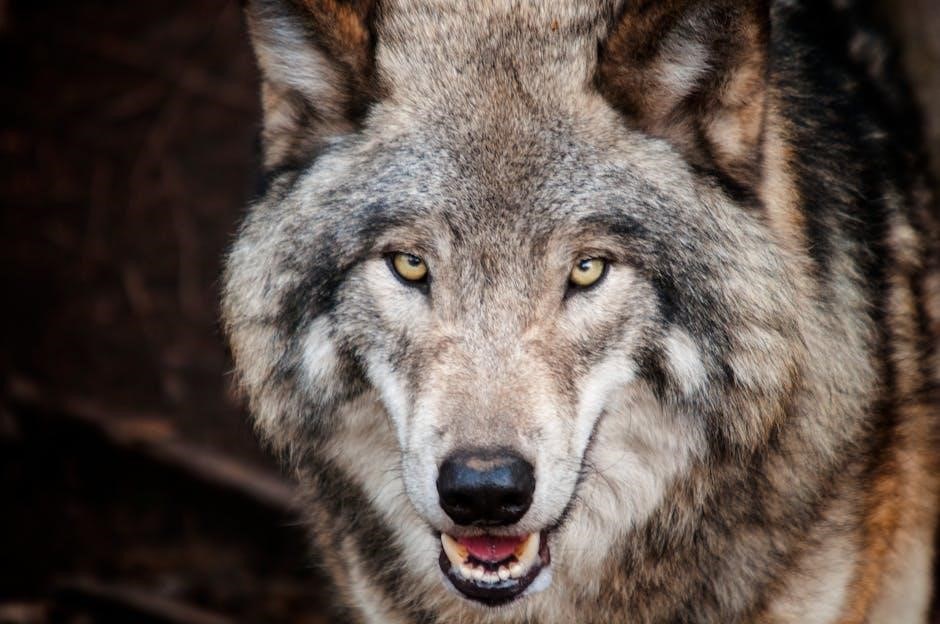The wolf spirit guide embodies intuition, loyalty, and freedom, offering wisdom and transformation. It serves as a powerful symbol of inner strength and resilience, guiding individuals to trust their instincts and navigate life’s challenges with courage and grace.
Overview of the Wolf Spirit Animal
The wolf spirit animal is a profound symbol of intuition, loyalty, and independence. It represents a deep connection to instincts and inner wisdom, often appearing as a guide during times of challenge or transformation. Wolves embody both solitude and community, reflecting the balance between personal freedom and collective harmony. Their presence encourages trust in one’s instincts and the pursuit of a path aligned with authenticity. The wolf’s resilience and adaptability make it a powerful ally for navigating life’s complexities, fostering growth and self-discovery. Its essence reminds us to embrace our wild nature while honoring our place within a larger community.
Importance of Spirit Guides in Spiritual Journeys
Spirit guides, like the wolf, play a vital role in spiritual journeys by offering guidance, wisdom, and support. They help individuals navigate life’s challenges, trust their instincts, and align with their true path. The wolf spirit guide, in particular, embodies intuition, resilience, and transformation, serving as a powerful mentor for self-discovery. By connecting with such guides, one can tap into their inner strength, gain clarity, and embrace their purpose. Spirit guides also foster personal growth, encouraging individuals to step into their power and live authentically, while providing protection and reassurance during uncertain times.

Key Traits of the Wolf Spirit Animal
The wolf spirit animal embodies intuition, loyalty, and fierce independence, highlighting intelligence, resilience, and a strong connection to instincts, guiding individuals in their spiritual journeys.
Intuition and Instinct
The wolf spirit guide strongly symbolizes intuition and instinct, teaching individuals to trust their gut feelings and inner wisdom. Wolves rely on their sharp senses and silent Knowing to survive, reflecting humans’ ability to navigate life’s challenges through instinct. The wolf’s connection to the night and wild emphasizes its role in guiding us to trust our intuition, even in uncertain situations. This trait encourages us to listen to our inner voice, fostering resilience and the ability to make decisions aligned with our true path. The wolf’s intuition mirrors our own, reminding us to balance logic with instinct for personal growth and harmony.
Loyalty and Guardianship
The wolf spirit guide embodies profound loyalty and guardianship, reflecting its role as a protector of family and community. Wolves are deeply committed to their packs, showcasing unwavering dedication and care for one another. This trait inspires individuals to nurture strong, loyal relationships and prioritize the well-being of loved ones. The wolf’s protective nature also symbolizes guarding personal boundaries and cherished connections, emphasizing the importance of trust and fidelity. By embracing the wolf’s loyalty, we are reminded to stand steadfast in our commitments and honor the bonds that strengthen our lives and communities.
Fierce Independence and Freedom
The wolf spirit guide symbolizes fierce independence and a deep desire for freedom. Wolves thrive in the wild, embodying a self-reliant nature that inspires individuals to break free from constraints. Their ability to roam untamed reflects a spirit of liberation, urging us to trust our inner compass and live by our own rules. The wolf’s independence doesn’t mean isolation; it’s about embracing solitude when necessary and trusting one’s instincts to navigate life’s challenges. This trait encourages us to seek autonomy and resist societal or self-imposed limitations, fostering a resilient and authentic way of living.

Cultural Symbolism of the Wolf
The wolf holds profound cultural significance, symbolizing loyalty, wisdom, and resilience across various traditions. Its imagery appears in mythology, folklore, and spiritual practices, representing both divine and wild aspects.
Wolf Spirituality in Native American Cultures
In Native American cultures, the wolf is revered as a sacred animal, symbolizing loyalty, wisdom, and strong familial bonds. Many tribes consider the wolf a powerful spirit guide, associated with intuition and protection. It is believed to offer guidance during challenging times and is often invoked for its wisdom and strategic thinking. The wolf’s howl is seen as a communication with the spirit world, representing a connection to divine energy and the Moon. Its presence in stories and rituals emphasizes community and the importance of working together, reflecting the wolf’s role in maintaining harmony within packs. Native Americans often seek the wolf’s teachings to enhance their spiritual journeys and strengthen their relationships with nature and others.
Wolf Symbolism in Other Cultures and Traditions
In Norse mythology, the wolf is linked to Odin, symbolizing war and victory, while in Celtic traditions, it represents cunning and hunting prowess. In Turkic and Mongolian cultures, the wolf is revered as a sacred ancestor and symbol of strength. Some traditions view the wolf as a duality symbol, embodying both light and dark forces. In Japanese folklore, wolves are seen as protectors of agriculture, while in Hindu mythology, they are associated with the god of fire. These diverse interpretations highlight the wolf’s universal significance as a powerful and transformative symbol across global traditions and belief systems.
Historical and Mythological Significance
The wolf holds profound historical and mythological significance across cultures, often symbolizing strength, loyalty, and survival. In Norse mythology, the wolf Fenrir represents chaos and destruction, while Odin is accompanied by wolves symbolizing war and victory. In ancient Rome, wolves were revered for nurturing the city’s founders, Romulus and Remus. Celtic traditions depict wolves as symbols of cunning and hunting prowess. Similarly, in Japanese folklore, wolves are seen as protectors of agriculture and sacred beings. These mythological narratives highlight the wolf’s dual nature, embodying both fierceness and protection, making it a revered and complex figure in human history and spirituality.

Spiritual Meanings of the Wolf
The wolf symbolizes intuition, inner wisdom, and community bonds, representing both light and dark, guiding individuals to embrace their dual nature and inner strength.
Freedom and Independence
The wolf spirit guide embodies the essence of freedom and independence, urging individuals to break free from constraints and trust their instincts. Wolves thrive in the wild, symbolizing a deep desire to live untamed and true to oneself. Their independence reflects self-determination and inner strength, encouraging people to embrace their authenticity. The wolf reminds us to trust our instincts and pursue our true path, unshackled by societal expectations. This spirit animal teaches the balance between personal freedom and responsibility, inspiring us to live harmoniously while staying true to our nature and desires.
Intuition and Inner Wisdom
The wolf spirit guide embodies intuition and inner wisdom, teaching us to trust our instincts and listen to our inner voice. Wolves rely on their sharp senses and intuition to survive, reflecting our own ability to navigate life’s challenges through inner guidance. The wolf encourages us to tune into our gut feelings and trust the wisdom within. This spirit animal reminds us to embrace our intuition as a powerful tool for decision-making and growth, helping us stay aligned with our true path and inner truth. By trusting our instincts, we can move through life with confidence and clarity.
Community and Connection
The wolf spirit guide emphasizes the importance of community and connection, reflecting the wolf’s pack mentality. Wolves thrive in groups, showcasing loyalty, cooperation, and teamwork. This spirit animal teaches us to value strong social bonds and the power of collective effort. The wolf reminds us to nurture relationships and work together toward common goals. By balancing individuality with unity, the wolf inspires harmony within communities. Its protective nature also highlights the importance of caring for one another, fostering a sense of belonging and mutual support. Through the wolf’s guidance, we learn to strengthen our connections and build resilient communities.
Duality of Light and Dark
The wolf spirit guide symbolizes the duality of light and dark, representing both intuition and ferocity. It embodies the balance between wisdom and wildness, teaching us to embrace our contradictions. The wolf’s howling at the moon reflects a connection to both the light of clarity and the darkness of the unknown. This duality encourages self-awareness and acceptance of our dual nature, fostering spiritual growth. By acknowledging both our gentle and fierce sides, the wolf guides us toward harmony and integration, helping us navigate life’s complexities with grace and resilience.

Practical Applications of the Wolf Spirit Guide
The wolf spirit guide encourages trusting instincts, fostering clear communication, and embracing personal growth. It inspires strength, resilience, and harmony, guiding individuals to navigate life’s challenges with intuition and courage.
Trusting Your Instincts
The wolf spirit guide emphasizes the importance of trusting your instincts, a trait deeply embedded in its nature. Wolves rely on their sharp senses and intuition to survive, teaching us to listen to our inner voice. This guidance encourages us to trust our gut feelings, even when logic is unclear. By tuning into our instincts, we can navigate life’s challenges with confidence and make decisions aligned with our true path. The wolf reminds us that intuition is a powerful tool for personal growth and self-trust, helping us stay attuned to our inner wisdom.
Encouraging Clear Communication
The wolf spirit guide highlights the importance of clear and effective communication. Wolves use vocalizations, body language, and teamwork to convey messages within their pack, demonstrating the value of transparency and collaboration. This guide encourages us to communicate openly and honestly, ensuring our intentions are understood. By embracing the wolf’s lessons, we can enhance our ability to express ourselves authentically, fostering stronger relationships and mutual understanding in both personal and professional spheres. Clear communication is vital for building trust and harmony, aligning with the wolf’s emphasis on unity and collective success.
Fostering Personal Growth and Transformation
The wolf spirit guide is a powerful symbol of personal growth and transformation. Wolves embody resilience and adaptability, teaching us to embrace change and thrive in challenging environments. Their intuitive nature encourages us to explore our inner wisdom, guiding us toward self-discovery and empowerment. The wolf’s journey reflects a balance between independence and community, reminding us that growth often requires both solitude and collaboration. By aligning with the wolf’s energy, we can break free from limiting patterns and transform our lives, embracing a path of authenticity and continuous evolution. The wolf inspires us to trust our instincts and evolve into our true selves.
Connecting with the Wolf Spirit
Connecting with the wolf spirit involves tuning into its energies of intuition, resilience, and freedom. Through meditation, spend time in nature, and reflect on the wolf’s howl, which symbolizes connection and resilience. Trusting your instincts is key, as the wolf guides you to embrace inner wisdom. Journaling your thoughts and emotions can deepen this bond, fostering self-reflection. The wolf’s presence encourages you to trust your inner voice and embrace transformation. By aligning with its energy, you can cultivate courage, loyalty, and a deeper connection to your true self, allowing the wolf spirit to guide you toward personal growth and empowerment.
